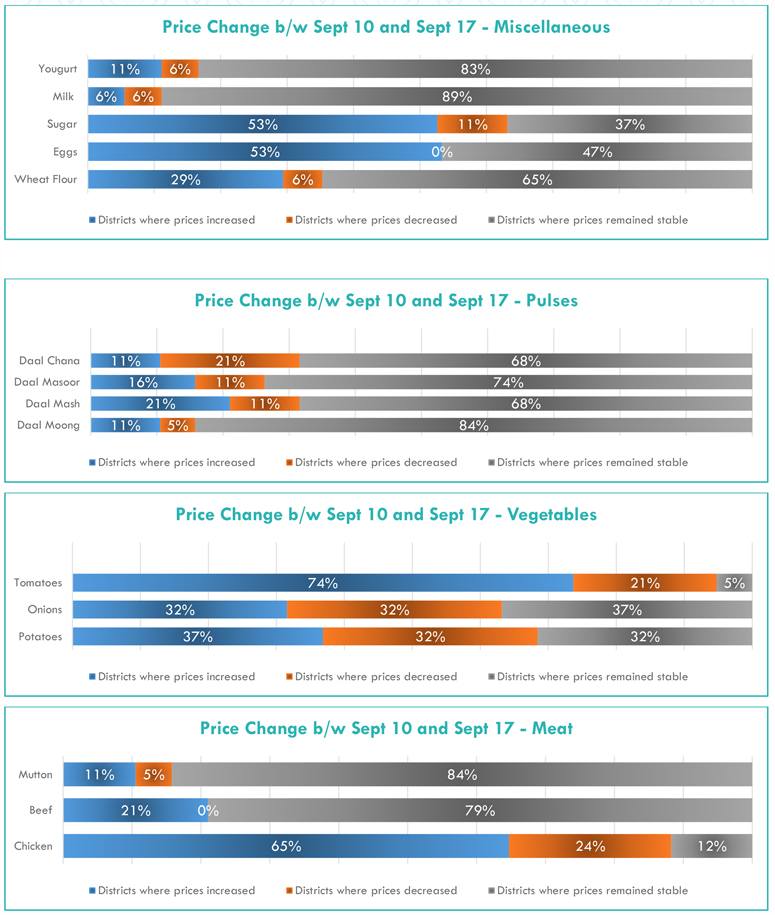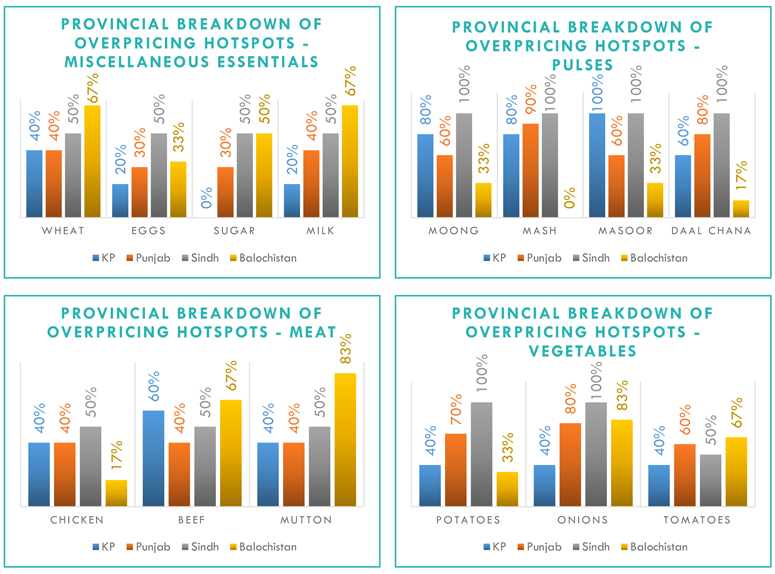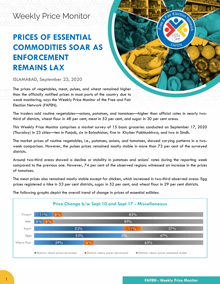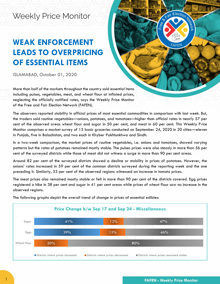ISLAMABAD, September 23, 2020: The prices of vegetables, meat, pulses, and wheat remained higher than the officially notified prices in most parts of the country due to weak monitoring, says the Weekly Price Monitor of the Free and Fair Election Network (FAFEN).
The traders sold routine vegetables—onions, potatoes, and tomatoes—higher than official rates in nearly two-third of districts, wheat flour in 48 per cent, meat in 52 per cent, and sugar in 30 per cent areas.
This Weekly Price Monitor comprises a market survey of 15 basic groceries conducted on September 17, 2020 (Thursday) in 23 cities—ten in Punjab, six in Balochistan, five in Khyber Pakhtunkhwa, and two in Sindh.
The market prices of routine vegetables, i.e., potatoes, onions, and tomatoes, showed varying patterns in a two-week comparison. However, the pulses prices remained mostly stable in more than 73 per cent of the surveyed districts.
Around two-third areas showed a decline or stability in potatoes and onions’ rates during the reporting week compared to the previous one. However, 74 per cent of the observed regions witnessed an increase in the prices of tomatoes.
The meat prices also remained mostly stable except for chicken, which increased in two-third observed areas. Egg prices registered a hike in 53 per cent districts, sugar in 52 per cent, and wheat flour in 29 per cent districts.
The following graphs depict the overall trend of change in prices of essential edibles:

The observers from several districts reported that essential grocery items’ official prices were not notified or readily available. The official rates of sugar and wheat flour were not accessible in 65 per cent and 35 per cent of the districts. The same went for three pulses—moong, masoor, and chana—missing in nearly 13 per cent of the regions and mash pulse in 17 per cent. Milk and yoghurt were not publicly available in 30 per cent and 35 per cent districts. Moreover, meat prices were missing in nine per cent regions and poultry in 26 per cent. However, the vegetables’ official rates were generally available except for 13 per cent of the surveyed markets.
The enforcement of the official market prices varied considerably across the districts. The traders sold onions above the officially notified price in 74 per cent of the observed districts. The overpricing ranged between Rs2 (Lahore) and Rs20 (Jacobabad). Similarly, tomatoes and potatoes went above the official rates in 57 per cent regions. The highest difference in the official and market prices of potatoes was in Washuk, where it sold at Rs35 above the official rates. In contrast, tomatoes went Rs70 above the official price in Jhal Magsi.
The interactive graph below shows the percentage of areas where official prices of essential commodities were missing:
In the meat category, mutton and beef were overpriced in 52 per cent of districts. The markets in Karachi South sold mutton and beef higher than the official price for Rs810 and Rs700. Moreover, markets in nearly 35 per cent of districts did not follow the officially notified rates of chicken. Multan reported the highest difference of Rs29 in the market price and official chicken rate.

The official and market prices of various pulses also saw a significant difference in many regions. Masoor and mash pulses were sold above the official prices in 65 per cent while chana and moong pulses at higher rates in 61 per cent of the districts. Mash pulse retailed at Rs193, moong Rs180, masoor Rs104, and chana Rs78 above the Karachi South markets’ officially notified rates.
Refined sugar and wheat flour were sold above official rates in 30 per cent and 48 per cent districts. A 20-kilogram wheat flour bag was priced Rs450 above the official rate in Washuk. Similarly, refined sugar was Rs36 higher in Karachi South. The market prices of per dozen eggs were also more than the officially notified rates in 30 per cent districts and the milk and yoghurt rates in 43 per cent and 52 per cent of the observed regions.
About the Monitor:
TDEA-FAFEN generates the Weekly Price Monitor covering 15 essential kitchen items, including basic groceries such as wheat, pulses, oil, sugar, and perishable commodities like meat, and vegetables.
The observers sought the official prices for this survey from the district administration or the market committees, and the wholesale rates through market surveys. In the case of Punjab, the government price app Qeemat Punjab was also used to obtain the official rates.
To download the complete report, click here



